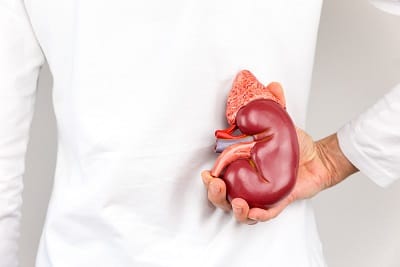A team of fourteen KU Leuven students has built a diagnostic device that can analyze the blood of kidney patients in five minutes. It’s a fast, inexpensive, portable alternative to the current slow, costly, lab-bound devices. With their design, the students won three prizes at the SensUs competition, an international competition for biosensors in the health sector.
Kidney failure
“The goal of the competition was to develop a tool to detect kidney failure,” says Hannah Agten, a team member who studies biochemical engineering. “Whether your kidneys function properly or not can be determined depending on the amount of creatinine in the blood and urine. Our muscles release creatinine as a waste product in our bloodstream. Normally, it is cleared by the kidneys from the bloodstream and excreted via the urine. However, if your kidneys are not working properly, you get a high level of creatinine in the blood and a low level in the urine. The students had to develop a tool that could measure the amount of creatinine in the blood plasma, quickly and at a reasonable price.”
Currently, these analyses are performed with spectrophotometers (large, expensive laboratory equipment), and the results are not directly available to the patient. Faster sensors that can be used outside the laboratory do exist, but the price tag is too high for individual patients.
The student team built a biosensor able to detect molecules in a sample of biological material. “The biological material we use is a sample of blood plasma from a kidney patient, and we screen it for creatinine,” Agten explains. “If you insert a blood sample in our biosensor, the creatinine reacts with the products in our assay, rendering a pink solution. The more creatinine, the pinker the solution will be. After five minutes, the concentration of creatinine is visible, indicating whether there is a problem or not.”
Race against the clock
After nine months, the teams had to present and test their biosensor at the SensUs competition in Eindhoven. “We received eighteen plasma samples in which we had to determine the amount of creatinine, as fast as possible,” Agten recalls. The KU Leuven team was the only team that always knew how to measure the correct values. “We won three of the four awards: the award for ‘Analytical Performance’ for the smooth and fast operation of our biosensor; the ‘Public Inspiration’ prize for our presentation; and the award for ‘Translation Potential’ for the possible uses of this device,” she recaps, before elaborating on that last category. “Our prototype can test a single molecule, but you could extend this to other molecules, so you could test all kidney diseases. You would also be able to work with urine instead of blood, or you could analyze other molecules, indicating other conditions. A portable device like this could also be of interest for physicians in nursing homes and home nurses, whose patients cannot move, or move only with great difficulty. Even for veterinarians this biosensor can be useful. We could also minimalize our tool to a device that you can click on a smartphone.”
Lab-on-a-chip
The research team of Professor Jeroen Lammertyn, coordinator of KU Leuven’s SensUs team, will further develop the biosensor. “With some adjustments, the device of our students can become a lab-on-a-chip,” Lammertyn says. “You should think of it as a small glass slide, containing microchannels with the thickness of a human hair. Through these channels, urine or blood can flow, and then the chip can measure the biomarkers very precisely. We are working on a publication and are looking to patent the technology.
“The first edition of the SensUs competition was definitely successful for us,” Lammertyn continues. “Next year, the contest will be about biosensors for cardiovascular diseases. We are now recruiting students to form a new team.” Ellen Staljanssens, a team member and biochemical engineering student, says it’s definitely worthwhile to participate: “Working with fellow KU Leuven students with complementary backgrounds has been an amazing experience. From the start of the project, we pursued our goal of developing a biosensor that has strong business potential. Stimulating further breakthroughs in life science is always worth the hard work.”


